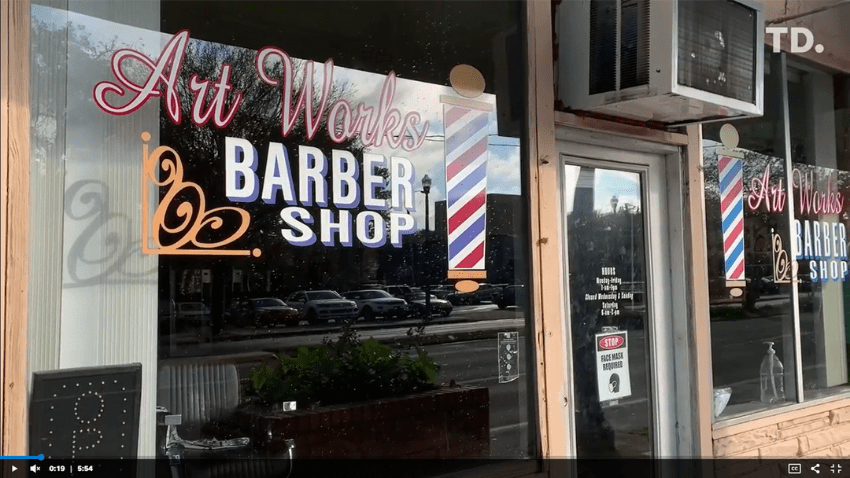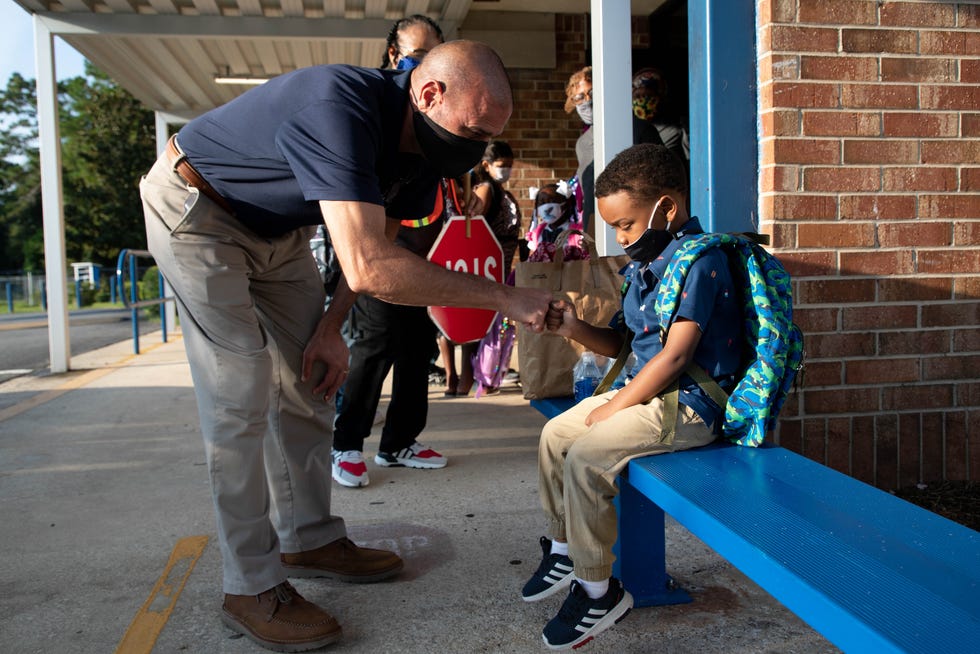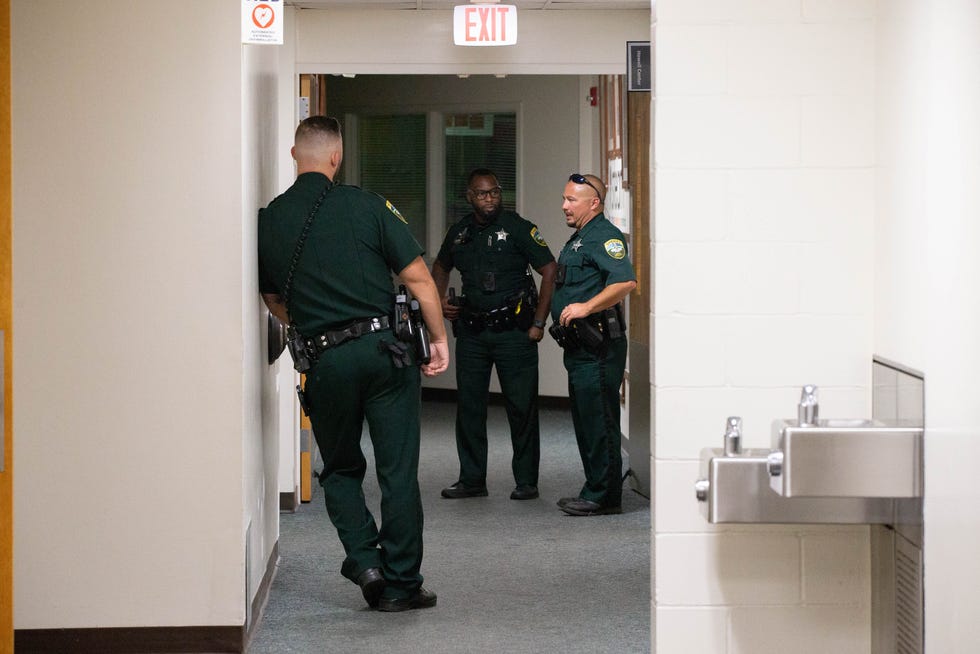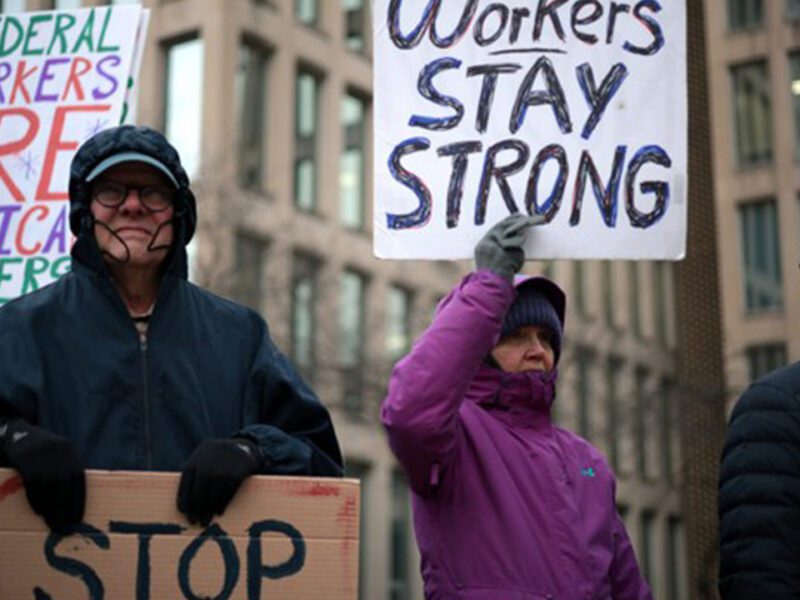
‘Life worth saving’: How police, schools, community leaders are trying to stop the shootings
Tallahassee Democrat | By Christopher Ann and Ana Goñi-Lessan | December 16, 2021
It’s a rainy fall morning at Rickards High School, and students, single file, shuffled their feet into the auditorium and eventually settled in their seats.
They missed class to hear the school district, law enforcement and community leaders beg them to end the gun violence that’s taken at least 15 lives this year. Two of them were their classmates.
“Students please listen. Please try to learn that violence is never the answer,” said Rickards principal Douglas Cook.
The assembly, part of the Stop the Violence campaign by Leon County Schools, featured all the big names: Leon County Sheriff Walt McNeil, Tallahassee Police Department Chief Lawrence Revell, Superintendent Rocky Hanna and FAMU football coach Willie Simpson, among others.
The 90-minute assembly was part of a united effort to reach out to the young Black teens and men, ages 15-24, who law enforcement say make up the largest group of homicide victims and offenders, according to an LCSO study of city and county homicides between 2015-2020.
“I love us, then I ask myself, if we love each other, why do we kill each other?” asked McNeil, who is Black, at the assembly.
Law enforcement, schools and community leaders are trying to find ways to not only answer that question, but also address it.
The Democrat contacted them to see what they are doing to take on youth gun violence.
Leon County Schools: Reaching students through assemblies, non-violent communication programs
According to data from the Florida Department of Education’s School Environmental Safety Report, in the 2019-2020 school year, only two incidents in the district were gang related.
This year, the stats may look a little different.
Since the beginning of the 2021-22 school year in August, at least nine Leon County K-12 students have been arrested for bringing weapons on campus, including loaded guns, brass knuckles and a Taser.
“Our number one responsibility is to keep our children safe while they’re in our care at school,” said Superintendent Hanna.
The school district quickly planned anti-gun violence assemblies, like the one at Rickards, after the students were found with loaded guns or weapons on school grounds on five separate campuses.
The school board also invited law enforcement, who spoke at two of its bi-monthly board meetings, to understand why.

At the lectern in the Aquilina Howell Center on Pensacola Street in late September, law enforcement advised Leon County residents to lock their cars to prevent stolen guns from finding their way into schools.
“Parents you have to be responsible, you got to know where your weapons are at all times,” said Paul Emmons, a school resource officer with the Leon County Sheriff’s Office.
John Hunkiar, the chief of safety and security for the district, added that the sheriff’s office would send more deputies to talk to students about the consequences of bringing a weapon to school.
Metal detectors were also considered as a precaution, Hunkiar said. Currently, hand-held wands have been used at school board meetings, and Hunkiar said the district is using them for school-based searches based on tips of concern.

In the two school board meetings law enforcement attended, gangs were alluded to but not explicitly mentioned. It’s not a secret, however, that gangs are one reason why kids are bringing weapons to school, and the district knows what they’re up against.
“It’s not that they don’t feel safe at school, they do,” said Hanna, “but it’s the environment in the neighborhood and their home life and the coming to and from school that gives them fear.”
While they do what they can from 7:30 a.m. to 3:50 p.m., the district says they don’t have the resources to do more for students outside of class and after the final bell rings.
After years of a steady decline in violent behavior, Hanna said there’s been an uptick in aggression among students. Many fights begin and escalate on social media; someone might say something, and another someone shares and boosts the post.
“It’s easy for us to expel kids from school and lock them up, but at the end of the day, that doesn’t help anyone. I think we need to listen to them to find out ‘What is causing you all to act out?’ ” he told the Democrat.
The district plans to implement non-violent communication programs in all of its secondary schools next semester with federal COVID-relief funds. If funds are approved by the state, the program will address aggressive behaviors and teach educators and students nonviolent communication methods, like how to express feelings and identify needs while under stress.
“If we can save one, that’s a life worth saving,” said Hanna.
TPD: Using ‘police intelligence’ to dismantle gangs
This year’s violence prompted the Tallahassee Police Department’s Juvenile Service Unit to transfer to the Violent Crimes Unit in June to specifically monitor and identify gangs, according to Jason Newhouse, the unit’s sergeant.
“It’s our primary focus, and it will be for the foreseeable future,” Newhouse said. “We’ve found that there are juveniles in the neighborhoods armed with guns claiming gang affiliations and threatening to do violence to rival gangs.”
Newhouse mentioned friction between south-side and north-side gangs, which were key components in multiple shootings in 2019 and 2020. Recently, a Ghazvini student who brought a loaded gun to school told police he was a member of a “South City gang” and carried the weapon for protection.
“People have been getting shot,” the minor told investigators according to court records.
The unit has been tracking and identifying gangs through criteria laid out in Florida statutes. The statute says a “criminal gang” is a group of more than two people whose primary activities include “the commission of criminal or delinquent acts” as well as a common name or identifying signs, colors or symbols.
Once TPD identifies a gang, its officers “focus” on it, leading to arrests for violent crimes, shooting incidents and possession of firearms by a delinquent, Newhouse said: “It’s been very fruitful.”
TPD has recently arrested and charged the majority of one Tallahassee gang’s essential members, Newhouse added. However, he would not identify the gang’s name or its arrested members to a reporter because it is considered “police intelligence.”
LCSO: Analyzing the data, focusing on early intervention
Like TPD, LCSO monitors gangs, especially using social media.
“We’ve always focused on gang activity,” said Sheriff Walt McNeil.
A lot of LCSO’s monitoring, McNeil said, is done by analysts who scrape the Internet, police reports, security footage and other resources to find suspects.
McNeil did not wish to go into further detail on LCSO’s gang monitoring system, saying he did not want “to give away all of our stuff.”
A day before Thanksgiving, LCSO released a first-of-its-kind report that breaks down homicide cases between 2015-2020. This report, “The Anatomy of a Homicide,” linked poverty to crime, highlighted distrust between arrestees and law enforcement and showed that both victims and assailants in homicides were overwhelmingly young, Black males.
McNeil said, in light of the report, he would like to create a special council to study gun violence and early intervention for troubled teens.
On Tuesday, Leon County County Commissioners voted to move forward with a plan to create a council that will focus on preventing gun violence amongst boys and young men. The City of Tallahassee, the sheriff’s office and Leon County School Board will assist in the council’s creation.
“If we are going to achieve the reduction in crime that we all hope to see … it’s going to take all of us in this community working together with the resolve to deal with the issues we know plague our community,” McNeil said to commissioners. “Something has to change, and I hope that this commission … will be ‘that’ something that starts the change.”
While deputies will arrest young people breaking the law, McNeil is searching for less severe solutions, like civil citations and counseling. He wants a more balanced approach.
“We are sensitive to the fact that many kids may not admit, even though they are suffering from some degree of trauma, just by growing up in the 32304 community,” he said. “The home setting is what often spills over into the streets of Leon County.”
TPD’s Citizens Advisory Council
Rudy Ferguson, the chairman of the Tallahassee Police Department’s Citizens Advisory Council, says he and the group’s members are actively collecting concerns and issues from Tallahassee’s residents to present to police officials and, hopefully, effect change.
After a bloody October weekend left five victims between 15–22 injured in three separate shootings, Ferguson called an emergency town hall meeting at a gymnasium in Frenchtown.
“We need to deal with the why,” Ferguson previously told the Democrat. “What is the root cause for all of this gun violence among young kids?”
He wanted this meeting to be run by kids who could provide clarity on the causes of youth gun-violence. However, only two young people showed up.
Kenyon Barber, an 18-year-old who attended Lincoln and Godby High Schools, and 17-year-old Jeremiah Williams, from Quincy, said the violence comes out of boredom and a drought of things to do.
“Tallahassee has no activities for the youth,” Williams said. “What can you expect with that… kids are going to look for something to do.”
Ferguson, who is running for an at-large seat on county commission, said the council will host three more meetings in different Tallahassee neighborhoods. He hopes to have a report of the council’s findings submitted to TPD, city and county officials and published publicly by the spring.
The goal of this report, Ferguson said, is to establish short-term and long-term solutions to a barrage of issues, namely gun violence.
“What avenues can TPD take to make you feel safer? This is what we want to find out,” he added. “We want to voice people’s concerns.”
Local government addresses inequity and poverty
Below is a small list of the county’s and city’s recent investments meant to address poverty and inequity in Tallahassee’s impoverished neighborhoods.
County:
- Expansion of the Community Human Services Partnership (CHSP) Promise Zone to include additional neighborhoods in 32304 by investing an additional $145,000 annually for human services resources.
- An annual investment of $1.7 million in the County’s Primary Healthcare Program to provide Leon County residents access to primary, dental, mental and mental health care. Approximately 61% of Neighborhood Medical Center’s patient visits are clients that live in the 32304 zip code.
- A $4 million partnership with Second Harvest to provide 3.4 million meals across Leon County, including over 20,000 bags of food to schools where children in neighborhoods in 32304 are zoned to attend.
City:
- The city pledges to invest $6.4 million to each the Greater Bond, Frenchtown and Griffin Heights Neighborhood First Plan, which are used to for beautification, economic development and crime prevention.
- Spent more than $2.5 million in funding provided through CHSP annually for not-for profits focused on addressing poverty issues.
- Provided over $840,000 in financial assistance through the CARES Housing Assistance Program.
- Directed $3.1 million of ARP funds toward homelessness and legal services for low-income residents facing evictions, foreclosures or unemployment compensation appeals.
A call to break down economic segregation
Kevin Warren agrees with law enforcement; Tallahassee’s violence isn’t like Chicago, Los Angeles or New York. But he says the capital city can be compared to Jacksonville, South Florida or other highly segregated communities in the country.
“The problem is we know it, but we allow another narrative to be told, so we never actually hit the mark to solve it,” said Warren.
Warren, founder and CEO of The LIFE Center, a nonprofit that works with at-risk youth and families, easily answers tough questions. He’s spoken at the school district’s anti-gun violence rallies, too, but his message is a little different.
Instead of pleading with students to make better choices, he gives them the facts.
“You live in the poorest ZIP code. You live in the most violent neighborhood.”
And he asks them difficult questions.
“How many of you have a gun?”
When Warren spoke at an anti-gun violence assembly at Chiles High School, a majority-white school, hands flew up with no hesitation. When he asked that question at Rickards, a Title 1 and majority-Black school, the students kept their hands to themselves.
Warren told it to them straight. He knows gangs aren’t carrying their granny’s 22 pistol.
“These kids are not out here with guns that they find in peoples’ glovebox, they are army-grade material,” he said.
Warren and his nonprofit created The Village of Care, a collaboration with other nonprofits in the county who provide wrap-around programming to youth and families. This includes a drop-in center for youth, parent support groups and connections to resources to tackle issues like mental health, food insecurity and unstable housing.
The Village of Care includes other nonprofits like Beehive Elite, Omega Lamplighters, Community Roundtable of Tallahassee 850 and Born2BeAMan.
Warren wants to meet the kids where they are – social media. Kids are watching their peers show off guns and flash wads of cash on Instagram stories. What if something new popped up on their feed?
“If we don’t appreciate or understand the value of social media and the connection to our reality, then we’re going to miss the opportunity to properly influence this generation,” he said.
Warren, the center’s other mentors and the school district are in the works to provide a safe space for students to learn social and emotional learning practices.
“Top stakeholders must begin to allocate some of their budgets and resources to funding the ideas, solutions and programs that have the relationships,” he said. “It’s essential to place the proper value on the darkest communities.”
The sheriff’s office says it has always monitored gang activity, and this isn’t the first time the school district has held anti-gun violence assemblies. The city and county have invested millions in Tallahassee’s poorest ZIP codes, too.
There’s a disconnect, however, between what these programs say they are achieving in these neighborhoods and what young Black men who actually live there see every day.
“You have to go to South City, you have to go to Hollyfield, you have to go to Joe Louis, you have to go to Griffin,” said 19-year-old Jordan, whose name has been changed because of gang threats. “You have to go out there because sitting behind a desk or sitting on the phone talking isn’t going to help. Right now there ain’t no leaders.”





